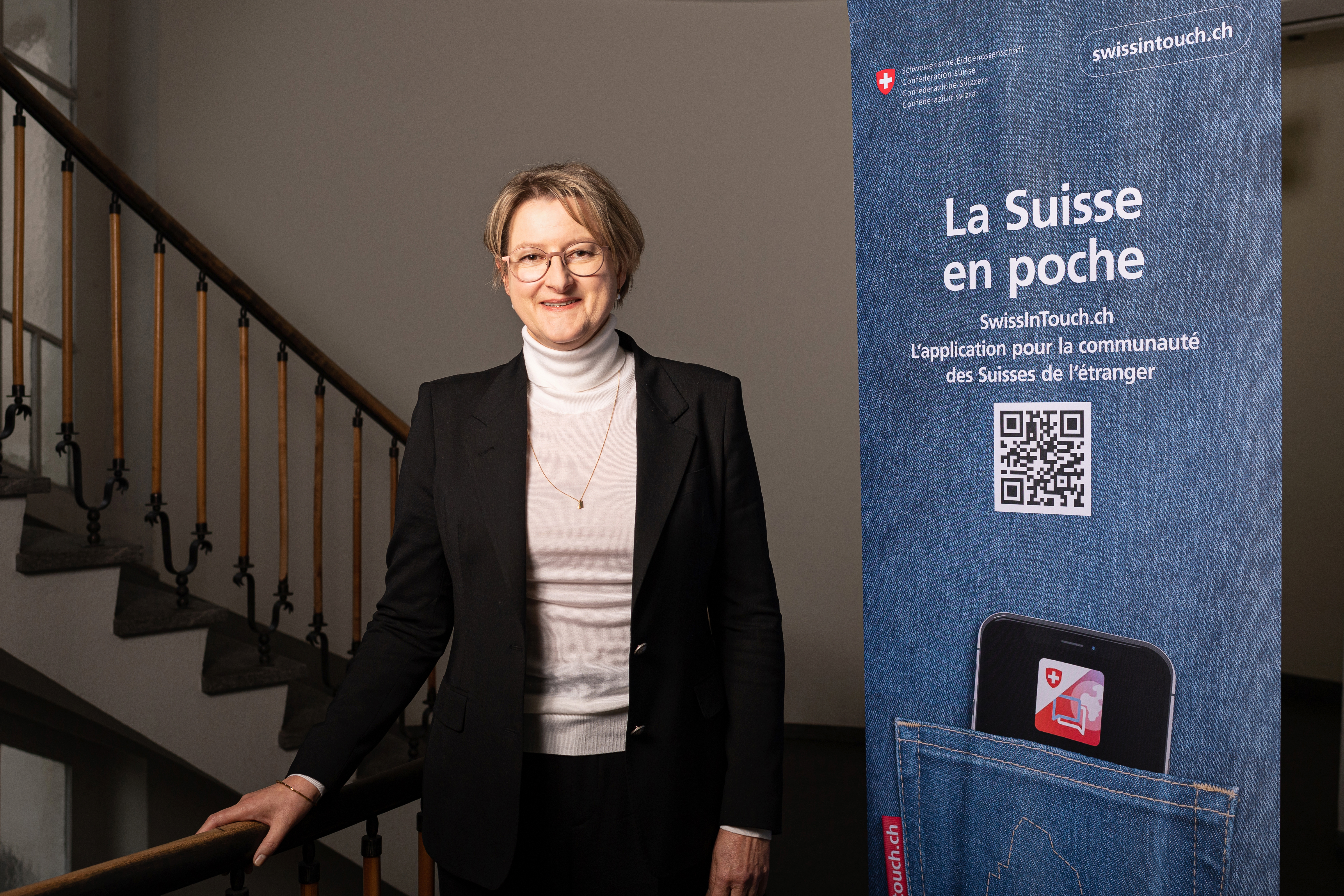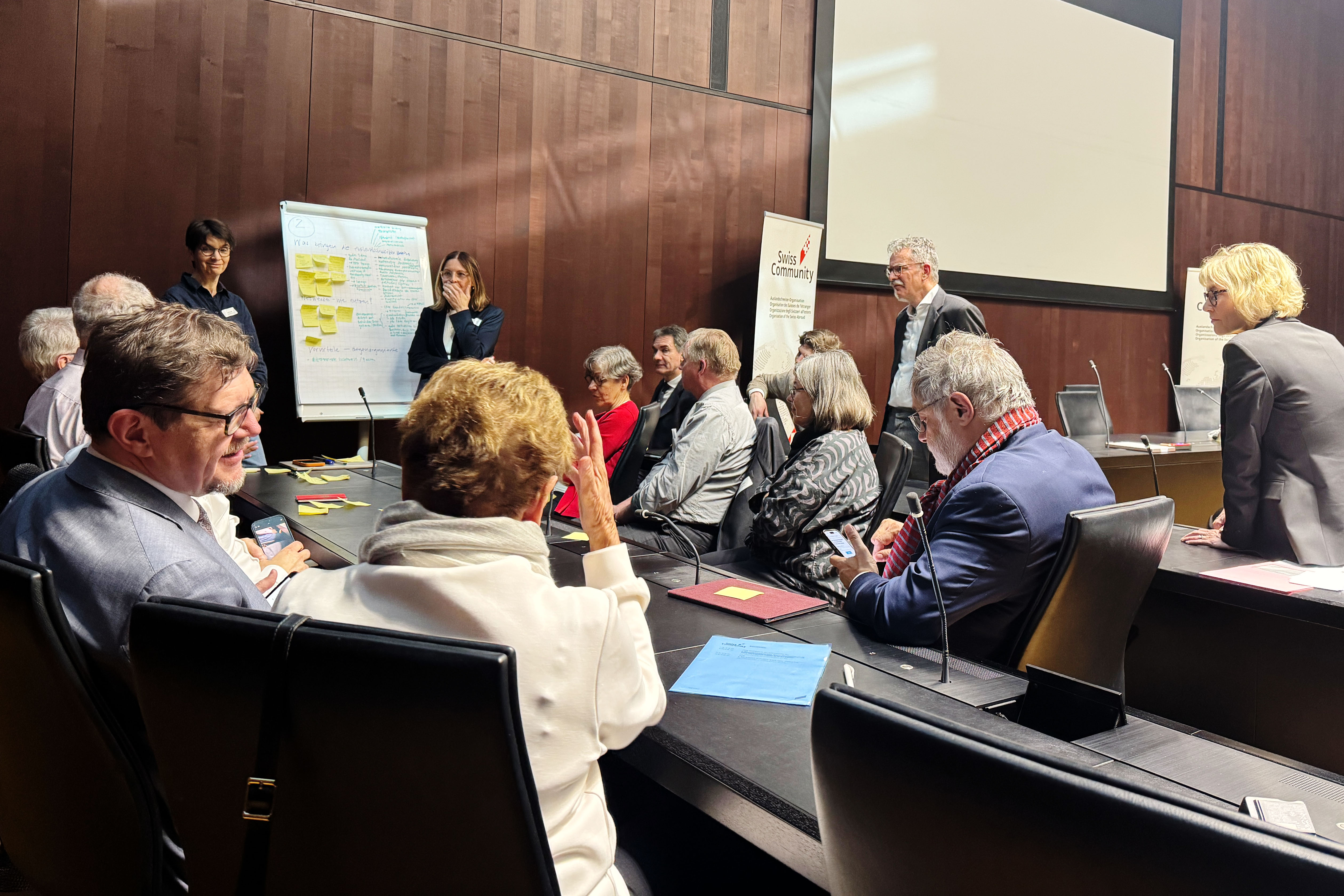Swiss Abroad ‘can be proud of the support they give their country’

Marianne Jenni took up the post of director of the Swiss foreign ministry’s consular division in January 2025. After 100 days in office, she takes stock of the challenges: the government’s cost-cutting measures, the digitisation of consular services and growing demand for prevention advice for Swiss nationals abroad.
The Directorate of Consular Affairs is the foreign ministry unit that oversees Switzerland’s consular network. Its smooth running is essential for the Swiss Abroad, since its decisions have a direct impact on the diaspora.
It is now headed by Marianne Jenni, who was most recently ambassador to Ecuador in Quito. With more than 30 years of consular experience under her belt, she knows all about the challenges of life abroad.
SWI swissinfo.ch: Marianne Jenni, you have led the consular office for 100 days. What is your initial assessment?
Marianne Jenni: Very positive. The office is working really well, thanks to qualified staff who are providing excellent services. I’ve been struck by their unflagging motivation and by all the projects underway.
I have also taken advantage of my new position to forge links with our various partners, such as the Organisation of the Swiss Abroad (OSA) and the Swiss Abroad cross-party parliamentary group.
SWI: Where do you see the biggest challenges at the moment?
M.J.: The digitisation of consular services is undoubtedly the most important challenge. More and more Swiss people are moving abroad, particularly older people. But at a time where the government is cutting costs, there is no increase in consular staff. We therefore need to find solutions to provide the same quality of service to more people, and digitisation is one of them.
Prevention advice also represents a major challenge. Many Swiss people go to live or travel in dangerous regions. Good preparation is also important for retired people, so they don’t underestimate the implications of moving abroad. Our role is to provide them with useful tools and information so that they are as well prepared as possible. We do this, for example, through campaigns such as Ageing AbroadExternal link or webinarsExternal link organised with the OSA.
In November 2025, the Swiss Abroad ActExternal link will celebrate its tenth anniversary. We’re going to use the occasion to raise awareness of the importance of prevention and to remind people of the principle of individual responsibility.
>> Find the latest statistics on the Swiss Abroad here:

More
You won’t find any Swiss in these countries
SWI: Do you have any concrete plans for digitising consular services?
M.J.: We are working on setting up a digital platform for consular services, particularly administrative registrations such as marriages or births. This work is being done in collaboration with other federal offices.
We are also looking at how the foreign ministry’s helplineExternal link, which is available 24/7, could be supported using artificial intelligence.
Marianne Jenni joined the foreign ministry as a consular employee in 1991. She worked in Paris, Lagos, Rome, London, Baghdad, Kinshasa and Cape Town before returning to Bern in 2013, where she was responsible for local and honorary staff abroad, as well as for the ministry’s real estate holdings. From 2021 to 2024, she was head of mission in Quito, Ecuador.
Source: Swiss Review
SWI: With an ageing Swiss Abroad population who may be less familiar with digital technology, is there a danger of excluding some of your customers?
M.J.: Yes, there is that risk. We want to prevent it, as far as possible, by anticipating problems. And the staff at our representative offices and on our helpline are always available to respond to queries from our compatriots.
The younger generations, however, are keen to see our services digitised and it will make life easier for them in many respects.
SWI: What are your immediate priorities as the new director of the consular division?
M.J.: In the very short term, I’m going to attend the congresses of Swiss clubs in France, Germany and Italy, because I think it’s important to have contact with the Swiss Abroad, especially in countries where they are most numerous.
It’s also important to listen to their concerns and needs. I’m thinking, for example, of the desire to increase the number of mobile passport stations. Our network is dense, but the Swiss government can’t be everywhere. So this service is very important – I’m aware of that.
Lastly, I hope to be able to conclude additional agreements with states that have representative offices in countries where we are absent, like our partnership with Austria. In the event of problems, the Swiss can then turn to this office. This allows us to be closer to our fellow citizens and to expand our network without incurring additional costs.

More
Can the Swiss Abroad salvage their image?
SWI: How will the consular network be affected by the government’s cost-cutting measures?
M.J.: There are no plans to close any embassies or consulates. As I said earlier, we intend to expand our network through partnerships with other countries.
SWI: Crisis management is one of the key tasks of the consular division. However, the Swiss Abroad often feel abandoned when unpredictable events occur. How do you approach this issue?
M.J.: If you are living or visiting abroad and a crisis happens, the first thing to do is to follow the advice given by the authorities of the country concerned.
In the event of a crisis, the foreign ministry and its representations inform Swiss nationals and provide them with assistance as far as possible, within the framework of consular protection. However, we cannot always intervene immediately in all parts of the world.
In certain cases and under certain conditions, we work with other states or third parties such as airlines to help Swiss nationals leave a crisis zone.
In the event of a persistent crisis, the foreign ministry may recommend that people leave the region. The persons concerned then take the decision to leave freely and do so at their own risk and expense.
We also do our utmost to inform our fellow citizens when we sense that a crisis is about to erupt and encourage them to (re)act. An important tool in this respect is our travel adviceExternal link. Let’s not forget that the law on the Swiss Abroad establishes individual responsibility as a fundamental principle of the relationship between the Swiss government and the individuals to whom it guarantees rights or can provide assistance.
In addition, the consular office and the representations do a great deal of work behind the scenes to help the Swiss, which it is not always possible to talk about publicly.
SWI: In Switzerland itself, the Swiss Abroad do not always get a good press. In recent months, they have been accused of taking advantage of the system without participating in it. What do you think about this?
M.J.: This question comes up regularly. Personally, during all my missions abroad, I have seen just how important the Swiss Abroad are for Switzerland’s image in the world. It’s not without reason that they are sometimes called “Switzerland’s ambassadors”. These people can be proud of the support they give to their country of origin.
Edited by Samuel Jaberg. Translated from French by Catherine Hickley/gw.

In compliance with the JTI standards
More: SWI swissinfo.ch certified by the Journalism Trust Initiative










You can find an overview of ongoing debates with our journalists here . Please join us!
If you want to start a conversation about a topic raised in this article or want to report factual errors, email us at english@swissinfo.ch.